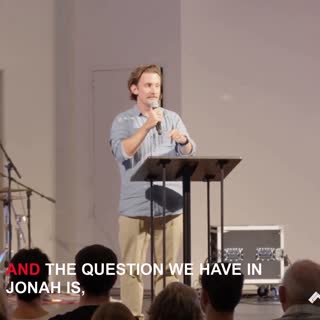Embracing Storms: God's Call to Transformation
Devotional
Sermon Summary
Bible Study Guide
Sermon Clips
"Sometimes, the storms in life are God's way of getting our attention. Sometimes, the storms in life, we learn in Jonah, are God's way of going, hey, hey, hey, let's go, wake up." [00:04:48] (18 seconds)
"And the question we have in Jonah is, are you going to say yes to that invitation? I love how C. S. Lewis says it, God whispers to us in our pleasures. He speaks in our consciences, but shouts in our pains. It is his megaphone to rouse a deaf world." [00:06:29] (23 seconds)
"How come some people go through suffering, and they become worse people? They become bitter, and angry, and sad, and they turn away, and they've kind of turned away from life. Have you seen these people?" [00:10:06] (14 seconds)
"Sometimes, you think, I don't want to go. I don't want to go there. God, I don't want to do that. I don't want to go through this. But sometimes, the only path forward is down, down to the depths, because that is where, unintuitively, like, you would never think so, that the scariest place is sometimes the place of salvation." [00:15:01] (29 seconds)
"The deepest waters is sometimes the place God wants to do something. That's incredible in your life. That's often the place of the greatest growth. Some of you guys in this room have experienced that." [00:15:41] (11 seconds)
"Here's what we learn from Jonah, guys, and from the Bible, from Jesus, that difficult decisions, suffering, pain, the pit. Deep loss. That's an invitation into something beautiful." [00:19:33] (21 seconds)
"God uses all of it. Friends, there's actually no other worldview that has something to give you in suffering. Like atheism just says it's random. Some religions say, well, it's your fault, actually. If you're suffering, it's because you sinned in a past life." [00:19:50] (19 seconds)
"What seems like an attack can actually be a mum, can actually be a birth. What seems like a birth, what seems like a monster can actually be a mother. What seems like a tomb can actually be a womb. What seems like death can bring new life." [00:24:26] (25 seconds)
"Jesus says, if you're looking for a sign that God is good, you're looking at Him. It's like, it's me. He's the sign. The God that stepped down from His throne into history because He loved us." [00:33:02] (18 seconds)
Ask a question about this sermon
"And the question we have in Jonah is, are you going to say yes to that invitation? I love how C. S. Lewis says it, God whispers to us in our pleasures. He speaks in our consciences, but shouts in our pains. It is his megaphone to rouse a deaf world." [00:06:29] (23 seconds)
"How come some people go through suffering, and they become worse people? They become bitter, and angry, and sad, and they turn away, and they've kind of turned away from life. Have you seen these people?" [00:10:06] (14 seconds)
"Sometimes, you think, I don't want to go. I don't want to go there. God, I don't want to do that. I don't want to go through this. But sometimes, the only path forward is down, down to the depths, because that is where, unintuitively, like, you would never think so, that the scariest place is sometimes the place of salvation." [00:15:01] (29 seconds)
"The deepest waters is sometimes the place God wants to do something. That's incredible in your life. That's often the place of the greatest growth. Some of you guys in this room have experienced that." [00:15:41] (11 seconds)
"Here's what we learn from Jonah, guys, and from the Bible, from Jesus, that difficult decisions, suffering, pain, the pit. Deep loss. That's an invitation into something beautiful." [00:19:33] (21 seconds)
"God uses all of it. Friends, there's actually no other worldview that has something to give you in suffering. Like atheism just says it's random. Some religions say, well, it's your fault, actually. If you're suffering, it's because you sinned in a past life." [00:19:50] (19 seconds)
"What seems like an attack can actually be a mum, can actually be a birth. What seems like a birth, what seems like a monster can actually be a mother. What seems like a tomb can actually be a womb. What seems like death can bring new life." [00:24:26] (25 seconds)
"Jesus says, if you're looking for a sign that God is good, you're looking at Him. It's like, it's me. He's the sign. The God that stepped down from His throne into history because He loved us." [00:33:02] (18 seconds)


















